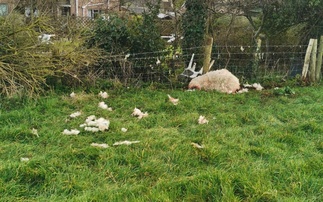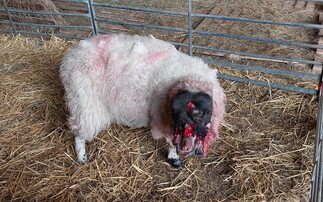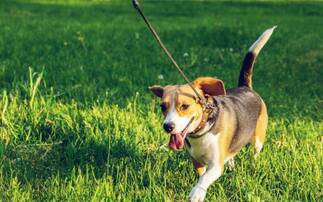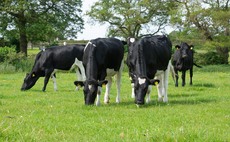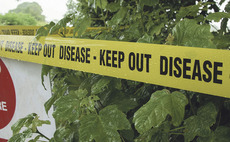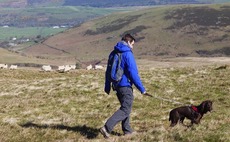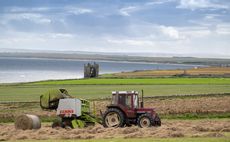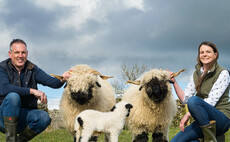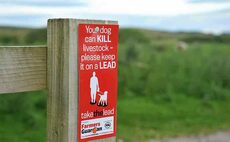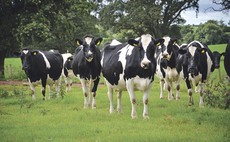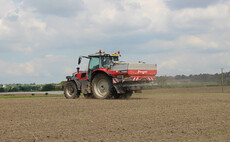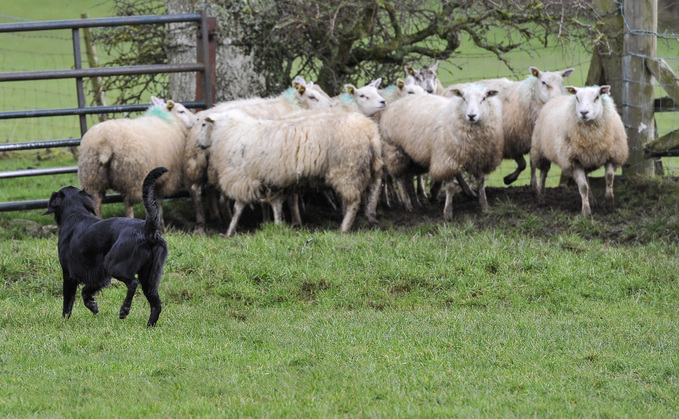
Nicola Noble, NSA project manager, said: "Barking, chasing and physical attacks can all have devastating effects on sheep, especially at this time of the year when so many sheep in the fields are heavily pregnant or have young, vulnerable lambs at foot."
Sheep worrying by dogs is an ongoing threat to animal welfare and farmer's livelihoods, according to the National Sheep Association (NSA).
Releasing details of a new survey on Monday (April 14), NSA said a failure of dog owners in the UK to recognise the threat their pet animals pose to farm livestock is leading to 'continued devastating attacks' on farm businesses.
READ NOW: 67% of farm shops have faced rural crime over past 12 months
Ahead of its annual sheep worrying awareness week, running from April 14 to 20, the charity has revealed that 87% of farmers had experienced a dog attack on their sheep flock in the last 12 months.
Livestock worrying
Around 73% of those surveyed said one dog had been involved in a livestock worrying incident, while 23% said two or more dogs had attacked their flock.
And 78% said dogs had not been put on a lead during an incident.
One farmer revealed they had 44 sheep killed in a single dog attack, the most by far, while another farmer had 23 sheep killed by a dog.
Íæż½ã½ã were asked to describe in words how incidents made them feel in the survey, with some using adjectives such as 'helpless, frustrated, needless and heartbreaking'.
LISTEN NOW:
Nearly 50% (43%) revealed they had to euthanise sheep after a dog worrying incident.
Dogs on a lead
Nicola Noble, NSA project manager, said the cause of incidents is mostly identified as the 'simple refusal' of dog owners to keep their pet on a lead whilst walking in the countryside.
"Dog owners often assume their beloved pet could not be capable of causing harm to other animals, yet it is an instinctive response of a dog to chase, and for some, attack prey animals such as sheep," Ms Noble added.
"Barking, chasing and physical attacks can all have devastating effects on sheep, especially at this time of the year when so many sheep in the fields are heavily pregnant or have young, vulnerable lambs at foot."
Íæż½ã½ã receive physical and verbal abuse
More than three-quarters (80%) of farmers said they had reported negative experiences from dog owners when confronting them to put their pet on a lead, with some reporting verbal and physical abuse.
And 98% of farmers said they want to see police issued with greater powers to deal with incidents more effectively.
And the important message of keeping dogs on leads near sheep is still not being followed with 'distressing consequences', the charity has disclosed.
Farming respondents to the survey on average reported four sheep deaths per year due to sheep worrying by dogs, this is an increase from previous years but still does not take into account additional losses from lamb deaths when miscarried by ewes due to stress from attacks.
As well as sheep deaths, extreme injuries will often cause 'long term pain and suffering' for animals and financial loss to farmers with increased vet bills and a reduced number of stock available to sell.
"Sheep worrying by dogs not only causes suffering to livestock but is also a real cause of stress and worry to farmers," Mrs Noble said.
Impact on farmers' mental health
"Íæż½ã½ã have reported in this and previous surveys that their mental wellbeing has been compromised by the continued threat to their animals.
"A high proportion (80%) of survey respondents also reported a negative experience when approaching dog owners to ask for their dog to be put on a lead with just under half receiving verbal and, in some cases, even physical abuse."
NSA said dogs straying from their homes and gardens is also identified as a frequent cause of attacks on sheep.
43% of survey respondents found evidence of a sheep worrying incident rather than the attack being witnessed by the farmer or another person, which NSA said could indicate straying dogs to be a cause, or a failure of dog owners to confess attacks happening.
Ms Noble said over half the respondents reported that attacks happened in private fields with no footpaths, and added incidents could be the result of straying dogs or a failure of dog owners to respect private farmland.
Such cases make it more difficult for farmers to pursue compensation, only adding to farmers' 'frustration and financial losses', according to NSA.
Almost half of this year's survey respondents said they did not pursue compensation, reporting feelings of 'helplessness' if and when cases were reported to the police.
Need for new legislation
Aphra Brandreth, MP for Chester South and Eddisbury, said it is concerning that there are a rising number of dog attacks taking place on farms, but added her Private Members' Bill could help alleviate the problem in the future.
She said the Dogs (Protection of Livestock) (Amendment) Bill, which is currently progressing through Parliament, could strengthen the law by increasing the fines incurred for prohibiting the law while giving the police greater powers to investigate crimes.
"My Bill will clarify what constitutes an offence and [could] give greater powers to investigate suspected incidents," she added.
"Our farmers work incredibly hard to care for their animals and produce our food – they deserve our full support."
READ NOW: #FGTaketheLead top tips: Enjoy the countryside this Easter - but keep your dog on a lead
Rob Taylor, Wales' Wildlife and Rural Crime Coordinator, said current livestock worrying legislation, dating back 72 years, was 'outdated and no longer fit for purpose'.
'Livestock worrying is a huge problem'
Mr Taylor, speaking on the urgent need for new legislation, said: "Livestock worrying is a huge problem as we have seen in the NSA's survey.
"I have been left disappointed in the past by having two similar pieces of legislation nearing close to completion and then falling through at the last hurdle, so I am extremely anxious of what could happen in the future.
"Updated legislation is badly needed to protect farmers.
"Providing police officers with the powers is needed so they can build evidence and prosecute those responsible for committing these sorts of crimes which, for too long, have gone unpunished.
"I believe the Bill could help alleviate the problem with greater punishment which will be enormous in lowering incidents in the future.
LISTEN NOW: The Íæż½ã½ã Podcast: Can a new educational course tackle livestock worrying attacks on farm?
"I would also urge them to think outside the box to build that education with countryside users.
"For instance, perhaps leaving a box with dog leads in a right of way area may just spark the need for a dog walker to put their dog on a lead and make a huge difference in the future."
Reporting incidents
NSA has also announced the launch of a new so sheep farmers can also report incidents to them as well as the police.
Katie James, communications manager at the sheep farming charity, said: "It is a common misconception that nothing will be done if farmers try to report cases of sheep worrying to the police.
"But if they are not reported, the true scale of this serious issue will never be fully appreciated and the work of NSA to push for stricter legislation and enforcement will not be realised.
"Although it is not a legal obligation to report cases, NSA is urging farmers to use its new service, as well as making reports to the police to get a better and more accurate record of cases and their locations.
"The new NSA online log form is very simple and easy to complete."
Take the Lead
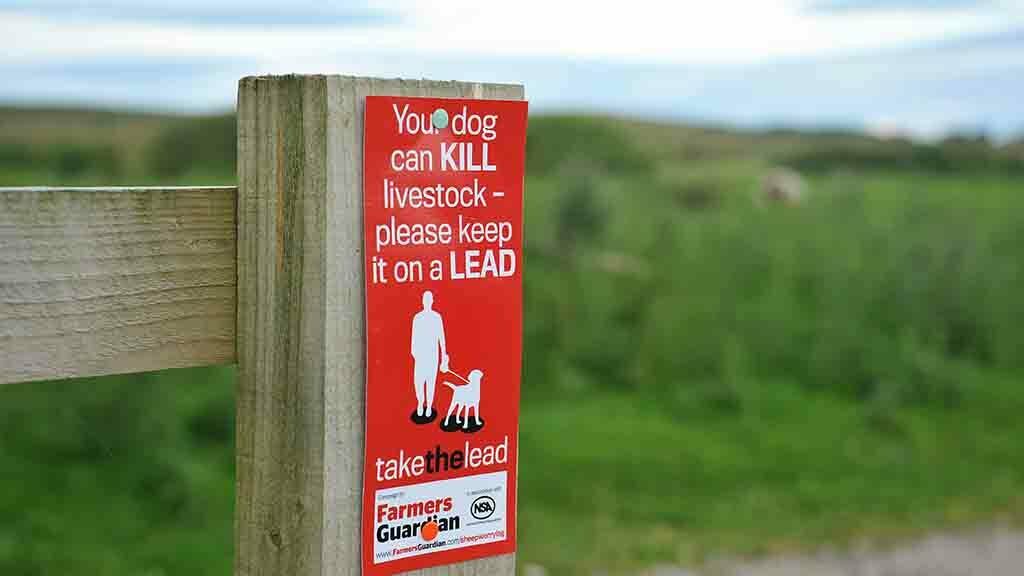
You can support Íæż½ã½ã's 'Take the Lead' campaign, in association with the National Sheep Association, to raise awareness of keeping dogs on lead when near livestock.
We can provide you with free signs to place around your farm warning dog owners to keep their dogs on a lead near livestock.
To request yours, send a stamped self-addressed A4 envelope to: FG Take the Lead, Íæż½ã½ã, Unit 4, Fulwood Business Park, Preston, Lancashire, PR2 9NZ.
We will be able to send up to 25 signs.
Alternatively, you can contact reporter Chris Brayford if you have been a victim of a livestock worrying incident and if you wish to share your story at [email protected].
READ NOW: Community shocked as arsonists set 300 bales of hay on fire at farm









